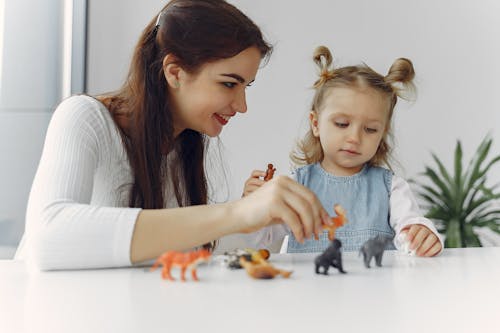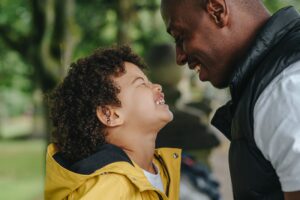April is Autism Acceptance Month. Recognition and awareness of autism are critical becuase they promote understanding, inclusion, and support for children with autism and their families. Despite more and more research and awareness of Autism Spectrum Disorder (ASD), many people still misunderstand what it is and what it means to have autism.
Autism is a neurological disorder that affects the way a person’s brain interprets and responds to social cues and situations. It often results in communication and language issues and impulsive, repetitive, or restrictive behaviors. ASD is a spectrum condition, meaning that some people with autism have excellent communication skills while others may be non-verbal.
Typically, autism is not diagnosed until a child is over two years old; however, in some cases, autism in toddlers and even babies can be detected or suspected based on early warning signs and behaviors.
Diagnosing Autism in Toddlers
It can be challenging to diagnose autism before two years old. However, there are some early signs and symptoms of autism in toddlers and babies. A 2019 study indicated that nearly half of the children in the study (41.9%) showed signs of autism between 7 and 12 months.
If you notice any behaviors or delays that concern you, keep track of them to discuss with your pediatrician at your baby or toddler’s next check-up. The American Academy of Pediatrics recommends developmental screenings for children at:
- 9 months
- 18 months
- 30 months
But if you are ever concerned about your child’s development, you can contact your pediatrician for additional screenings and to review a development checklist for your child’s current age.
The M-CHAT (Modified Checklist for Autism in Toddlers) is available on the Autism Speaks webpage. The M-CHAT cannot offer a diagnosis, but it is a 20-question screening test for children between 16 and 30 months old that lets you know if you should seek further evaluation.
Signs of Autism in Babies and Toddlers
- Language delays: By four months, they lack babbling or cooing, and they fail to respond to their name by six months.
- Declining eye contact or lack of eye contact by six months old.
- Reduced or delayed smiling. Not smiling at familiar faces at two to three months.
- Not pointing at objects of interest by nine months.
- Reduced interest or engagement with caregivers.
- Lack of eye tracking or following objects.
- A regression in any skills your baby had.
In older children (18 months – 3 years), signs include:
- Severely delayed or absent speech
- Struggling with changes in routine
- Echolalia or repeating words or phrases rotely
- Repetitive movements such as hand flapping, spinning, or rocking
- Hyper-focusing on objects other than toys or lining up toys in orderly rows instead of playing
- Delays in toilet training and persistent gastrointestinal issues
Early Intervention
Receiving an ASD diagnosis for your toddler is often world-changing, and some parents delay or refuse evaluation suggestions by early childhood professionals and pediatricians becuase the idea that their child could have ASD is heart-breaking. But autism isn’t a terrible thing.
An autism diagnosis does mean your child’s life may take a different path than you imagined, and it will have some unique challenges. Still, the earlier parents start intervention, the better their child’s chances of leading a typical and productive life are!
The early intervention your child needs will be based on their skills and areas of developmental need. Early intervention are services provided at the preschool age, usually between ages two to three. EI for toddlers will include the teaching of skills that children usually learn in the first two years of life like:
- Physical skills
- Cognitive skills
- Communication skills
- Social skills
- Emotional skills
Services may include:
- Family training
- Speech therapy
- Hearing impairment services
- Physical therapy
- Occupational therapy
- Nutrition services
While there is no cure for autism, research shows that early intervention is critical in helping children with autism lead successful and happy lives.
Early Intervention Resources
There are many resources available for parents and caregivers of children with autism, many of which are right at your fingertips! Autism Speaks hosts an excellent resource site where parents can find information about everything from screenings to support groups to therapy and financial assistance based on their zip code.
- Autism Speaks Resource Guide
- Autism Society
- Individuals with Disabilities Education Act (IDEA)
- Autism Parenting Magazine
- Center for Parent Information and Resources
- The Autism Now Center (ARC)
All children develop differently, and if your child is one of the millions who have autism, it simply means their brain has a different way of responding to the world. The more people learn about autism and neurodivergent conditions, the more acceptance and understanding there will be. If your family is dealing with an autism diagnosis, embrace it and help your child see their unique strengths and start early to help them learn the skills needed to take the world by storm!
To learn more, check out the CDC’s Autism FAQ Page.
By L. Elizabeth Forry, April 26th, 2024












